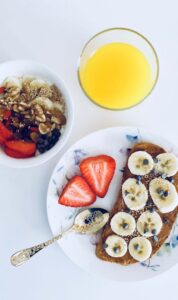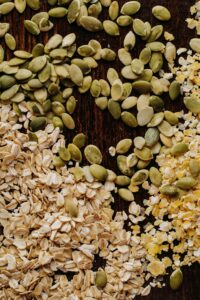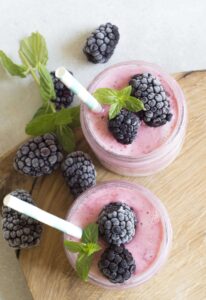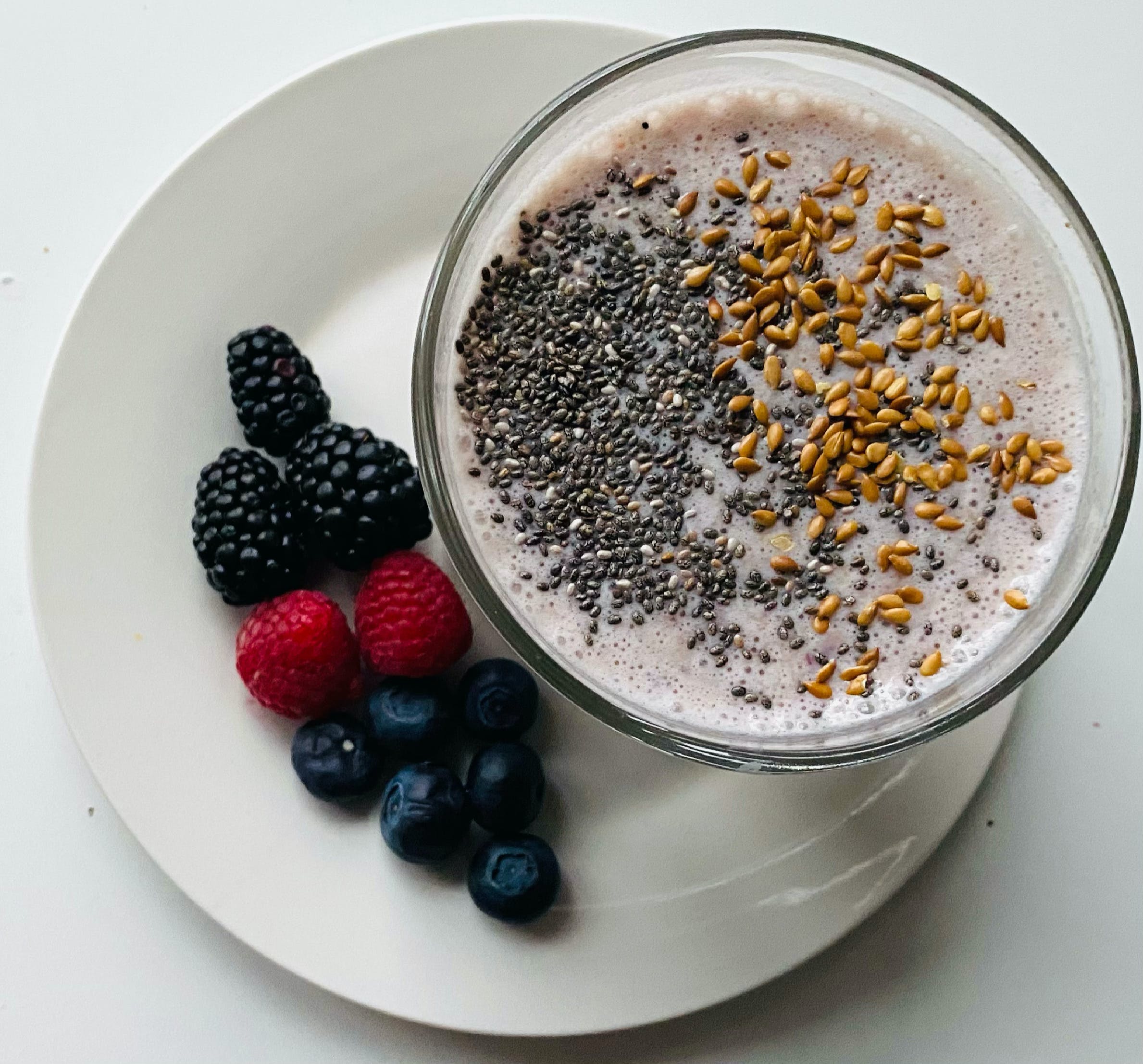Energy-giving food we consume serves as fuel for our bodies, so it’s crucial to choose the right types of food to maximize energy and enhance metabolism.
In this article, we will explore the best foods that give you energy and provide valuable insights into how they can help you beat fatigue and stay active throughout the day.
Before we delve into the list of Energy-giving foods, it’s essential to understand how our bodies process and utilize the calories we consume.
When we eat a large meal, our bodies expend a significant amount of energy to digest it, often resulting in a feeling of lethargy and fatigue known as “food coma.”
To avoid this energy drain, it’s recommended to distribute meals in smaller portions throughout the day and include foods that provide sustained energy.
15 Secrets You Didn’t Know About Energy-giving food
Eggs
Eggs have long been a staple in the diets of fitness enthusiasts, and for good reason.
Loaded with high-quality protein and essential amino acids, eggs are an excellent source of energy.
They are also rich in healthy fats and important micronutrients such as iron, phosphorus, selenium, and various vitamins (A, D, B6, and B12).
Beans
For those seeking a vegetarian alternative to meat, beans are an excellent choice.
Packed with protein, beans provide a steady release of energy, helping to stabilize blood sugar levels.
They are also rich in iron, magnesium, and folic acid, which contribute to overall energy production in the body.
Incorporating beans into your meals or enjoying them as a snack can help you maintain high energy levels throughout the day.
Chia Seeds
Considered a superfood, chia seeds offer a myriad of health benefits, including boosting energy levels.
These tiny seeds are packed with alpha-linolenic acid (an omega-3 fatty acid), protein, fiber, vitamins, antioxidants, and minerals.
Adding a sprinkle of chia seeds to your meals can provide a significant nutritional boost and help sustain energy levels throughout the day.
Oatmeal
When it comes to breakfast choices, oatmeal stands out as one of the most nutritious options.
Loaded with fiber and healthy carbohydrates, oatmeal provides a sustained release of energy, keeping you active throughout the day.
The complex carbs in oatmeal digest slowly, ensuring a steady stream of energy and preventing energy crashes.
Whether you’re on a calorie-deficit diet or not, incorporating oatmeal into your morning routine can help you maintain optimal energy levels.
Banana

For a quick and natural energy boost, reach for a banana. This fruit is rich in naturally occurring sugars, combined with fiber, which slows down digestion and provides sustained energy.
Bananas are also high in potassium and other essential nutrients, making them a perfect snack for an instant energy pick-me-up.
Nuts and Seeds

Nuts and seeds, such as walnuts, cashews, almonds, pecans, pumpkin seeds, sunflower seeds, and Brazil nuts, are powerhouse foods that provide an abundance of nutrients.
These include healthy fats, protein, vitamins, and minerals that contribute to sustained energy levels.
However, it’s important to consume them in moderation, especially if you’re on a calorie-deficit diet, as they are calorie-dense.
Chicken
Chicken is a fantastic source of lean protein, making it an ideal choice for those looking to boost energy levels.
Packed with essential nutrients, including niacin and vitamins B6 and B12, chicken supports energy production and overall growth.
Compared to red meats, chicken is also low in saturated fat, making it a healthier option that still provides the necessary nutrients for optimal energy levels.
Brown Rice
When it comes to carbohydrates, choosing the right type is crucial for sustained energy levels. Brown rice, a healthier alternative to white rice, is an excellent source of energy.
It contains higher levels of fiber, vitamins, and minerals due to its less processed nature.
Additionally, brown rice has a lower glycemic index than white rice, meaning it has a slower impact on blood sugar levels.
By incorporating brown rice into your meals, you can regulate your energy levels more effectively.
Chickpeas
Chickpeas, also known as garbanzo beans, are a fantastic source of complex carbohydrates and dietary fiber.
These legumes provide sustained energy and are packed with protein and vitamin B9, which contribute to an instant energy boost.
Chickpeas can be incorporated into various Energy-giving foods or enjoyed as a quick and nutritious snack, making them a versatile addition to the list of Energy-giving foods.
Dairy Products
Milk, yogurt, and cheese are excellent sources of protein and calcium, crucial for bone health and muscle function.
Nuts and Seeds
Almonds, walnuts, and chia seeds provide healthy fats, protein, and fiber for lasting energy.
Sweet Potatoes
Packed with complex carbs, sweet potatoes offer a nutrient-dense energy source.
Water
Staying hydrated is essential for maintaining energy levels. Dehydration can lead to fatigue, affecting both work and play.
Spinach
This nutrient-packed leafy vegetable is available year-round and is an excellent source of iron and vitamins A, K, B12, and C. It also contains manganese and magnesium, which are good, healthy energy sources for the whole family.
Fruits
Oranges are high in vitamin C and natural sugars; they provide a refreshing energy boost. Apples: The combination of fiber and natural sugars in apples offers a steady energy release.
Bodybuilding Foods
Lean Proteins:
Chicken, turkey, fish, eggs, and plant-based proteins like tofu are essential for muscle repair and growth.
Rich in amino acids, these proteins provide the building blocks necessary for the development and maintenance of lean muscle mass.
Dairy Products:
Milk, yogurt, and cheese are excellent sources of protein and calcium, crucial for bone health and muscle function.
The protein in dairy aids in muscle recovery, making these foods a staple for individuals focusing on bodybuilding.
Quinoa and Legumes:
Quinoa is a complete protein, containing all essential amino acids, while legumes such as lentils and beans offer a plant-based protein source.
These foods contribute to muscle development, making them valuable additions to a bodybuilding-oriented diet.
Protective Foods
Colorful Vegetables:

Vegetables rich in colors signify diverse phytonutrients, vitamins, and minerals that support overall health.
Antioxidants in vegetables combat oxidative stress, bolstering the immune system and protecting the body from diseases.
Berries:

Blueberries, strawberries, and other berries are packed with antioxidants and vitamins, offering protective benefits against inflammation and oxidative damage.
The compounds in berries contribute to heart health and overall well-being.
Fatty Fish:
Salmon, mackerel, and trout are rich in omega-3 fatty acids, which play a role in reducing inflammation and supporting cardiovascular health.
These fatty acids are essential for maintaining the integrity of cell membranes and promoting overall protective functions.
Energy-giving food gives us the energy to work and play
Energy-giving foods that provide us with the energy needed for work and play are those rich in macronutrients, particularly carbohydrates for quick energy, proteins for muscle support, and healthy fats for sustained energy.
Here’s a breakdown of energy giving food examples suitable for both work and play:
Whole Grains: Brown rice, quinoa, oats, and whole wheat provide a steady release of energy due to their complex carbohydrate content.
Sweet Potatoes: Packed with complex carbs, sweet potatoes offer a nutrient-dense energy source.
Bananas: Portable and rich in carbohydrates and potassium, bananas provide quick energy and help prevent muscle cramps.
Chicken Breast: A lean source of protein crucial for muscle repair and energy production.
Fish: Salmon, tuna, and other fatty fish not only provide protein but also omega-3 fatty acids for sustained energy.
Eggs: A complete protein source with essential amino acids for muscle function.
Avocado: Packed with monounsaturated fats, avocados offer sustained energy and support cardiovascular health.
Nuts and Seeds: Almonds, walnuts, and chia seeds provide healthy fats, protein, and fiber for lasting energy.
Olive Oil: A good source of healthy fats, olive oil is excellent for cooking and dressing salads.
Berries: Blueberries, strawberries, and raspberries are rich in antioxidants and natural sugars for quick energy.
Oranges: High in vitamin C and natural sugars, oranges provide a refreshing energy boost.
Apples: The combination of fiber and natural sugars in apples offers a steady energy release.
Water: Staying hydrated is essential for maintaining energy levels. Dehydration can lead to fatigue, affecting both work and play.
Greek Yogurt: High in protein and probiotics, Greek yogurt supports muscle health and digestion.
Milk or plant-based alternatives: source of calcium and vitamin D, crucial for bone health and overall well-being.
Trail Mix: Combining nuts, seeds, and dried fruits, trail mix is a convenient and energy-dense snack.
Energy Bars: Look for bars with a good balance of carbohydrates, proteins, and fats for quick and sustained energy
Broccoli, spinach, and kale: Packed with vitamins and minerals, these vegetables contribute to overall health and energy.
Carrots and bell peppers provide a crunchy and nutritious snack rich in antioxidants.
Incorporating a variety of these foods into your diet ensures a well-rounded approach to fueling your body for both work and play. Balancing macronutrients and staying hydrated are key components of maintaining optimal energy levels throughout the day.
Let’s suppose we have chocolate. How can we verify if it is an energy-giving food or not?
Verifying whether chocolate is an energy-giving food involves examining its nutritional content, particularly the presence of macronutrients that contribute to energy production.
Here’s a simple guide on how to assess if chocolate qualifies as an energy-giving food:
Check the nutritional label:
- Look at the nutritional information on the packaging. A typical energy-giving food will have a noticeable presence of macronutrients like carbohydrates, fats, and proteins.
Evaluate carbohydrate content:
- Carbohydrates are a primary source of energy. Check the carbohydrate content in the chocolate. If it contains sugars or complex carbohydrates, it contributes to the overall energy content.
Assess fat content:
- Fats are a concentrated source of energy. While chocolate does contain fats, it can be healthy (like cocoa butter) or less desirable (added saturated fats). Healthy fats contribute to sustained energy.
Look for protein content.
- Protein is essential for muscle repair and overall energy balance. While chocolate is not a high-protein food, it may contain some, especially if it has nuts or added protein sources.
Consider the cocoa percentage:
- Dark chocolate with a higher cocoa percentage often contains more antioxidants and potentially more beneficial nutrients. Cocoa has stimulant properties, including a small amount of caffeine, which can contribute to alertness and energy.
Analyze sugar levels:
- Sugars provide a quick energy boost but can lead to energy crashes. Check the sugar content; moderation is key to avoiding sudden spikes and drops in energy levels.
Portion size matters:
- Even if chocolate contains energy-providing nutrients, the overall portion size matters. Consuming large quantities can lead to excess calorie intake, which may result in weight gain rather than providing sustainable energy.
Consider additional ingredients:
- Check for additional ingredients, such as nuts, dried fruits, or seeds. These can contribute to a more balanced nutrient profile, enhancing the energy-giving potential of the chocolate.
Understand the purpose:
- Consider the purpose of consuming chocolate. While it can provide a quick energy boost, it should be part of a balanced diet. Chocolate should not replace nutrient-dense meals but can be included as a treat or snack.
Personal Response:
- Some people may feel an energy boost after consuming chocolate due to the sugar and caffeine content, while others may not experience the same effect.
In conclusion, chocolate can indeed be considered an energy-giving food, primarily due to its carbohydrate and fat content. However, moderation and awareness of its nutritional composition are crucial for incorporating it into a balanced diet for sustained energy rather than relying on it as a primary energy source
Conclusion
Incorporating the best energy-giving foods into your diet can have a significant impact on your overall energy levels and metabolism.
By choosing nutrient-dense options like eggs, beans, chia seeds, oatmeal, bananas, nuts, seeds, chicken, brown rice, and chickpeas, you can provide your body with the fuel it needs to perform at its best.
Remember to stay hydrated and make mindful choices when it comes to your diet. Small steps towards a healthier lifestyle can lead to noticeable differences in your energy levels and overall well-being.
FAQs
What should I eat to stay active?
Maintaining a balanced diet is key to leading a healthy and active life. It’s important to be mindful of your food choices, avoiding excessive sugar and processed or packaged foods.
What are the primary culprits for causing fatigue?
Processed foods (such as chips, cookies, crackers, and noodles), sugar, and packaged drinks (like cola and fruit juices) are among the main factors that can lead to fatigue and low energy levels.
What are some other foods that provide energy?
In addition to the foods mentioned in this article, other energy-giving food names include apples, avocados, lean meats, whole grains, spinach, and green tea.
why are carbohydrates called energy-giving food?
Carbohydrates, through processes like glycolysis and the citric acid cycle, release energy crucial for bodily functions.
Remember, maintaining high energy levels and optimal metabolism requires a holistic approach that includes regular exercise, sufficient sleep, and a well-balanced diet.
By incorporating these energy-giving foods into your meals and making healthy lifestyle choices, you can fuel your body for optimal performance and enjoy increased vitality throughout the day.

